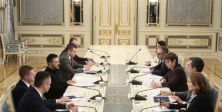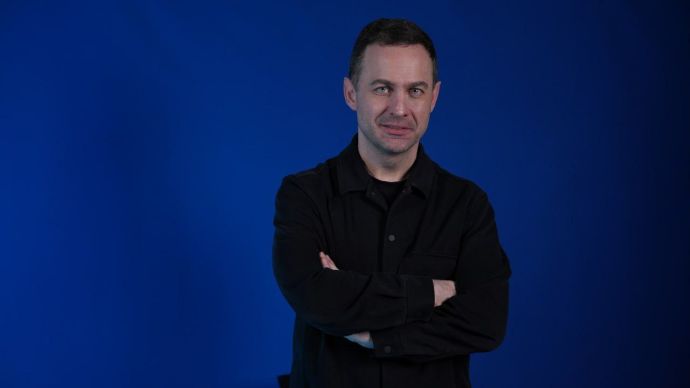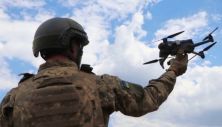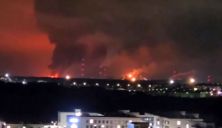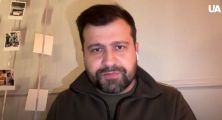On Victory Day, Prigozhin continued media attacks on the leadership of the Ministry of Defense. Prigozhin will still have to go to Moscow.
While Russian Defense Minister Sergei Shoigu held a parade in Moscow, Prigozhin accused the Defense Ministry of not receiving ammunition from the Wagner unit in Bakhmut (Donetsk region) and that one of the army units “fled from the flanks.” The conflict between Prigozhin and the Moscow Region is escalating. A compromise solution to the conflict is virtually impossible.
Prigozhin stated (he posted after the end of the parade in Moscow) that PMC Wagner received at most 10% of the promised ammunition.
The 72nd brigade of the Russian Defense Ministry left its positions on May 9: a strategic foothold where about 500 Wagner PMC mercenaries were killed: “They exposed the front almost two kilometers wide and 500 meters deep.”
The Armed Forces of Ukraine are “tearing the flanks” and will soon go over to the counteroffensive. If the front is broken, the Armed Forces of Ukraine can reach Rostov.
The previously promised new Gazprom PMC has yet to arrive at the scene. “Wagner” remains in Bakhmut “for a few more days.” Prigozhin’s nightly video voiced the most critical messages (quotes): “The country is being defiled. The main enemy is not the Armed Forces.”
At the end of April, Yevgeny Prigozhin, answered the question of whether PMC Wagner could turn around and go to Moscow:
“The idea is interesting, but they didn’t think… Second – if you are afraid, then fight in Bakhmut yourself. PMC “Wagner” came from Africa with a full combat kit when it became hard for the Motherland. While it is hard for the Motherland, we are here. If everything is in order with the Motherland, let us go to free bread”.
Thus, he hinted that if Moscow does not consider Wagner’s interests, the PMC is ready to defend them with arms in hand. Including – “a trip to Moscow.”
So, Prigozhin gives a clear message: the Defense Ministry is holding a parade in Moscow, and at this time, on the front, Wagner is the only unit that “fights for Russia.” He directly accuses army units of cowardice.
The conflict against the backdrop of Victory Day in Russia (in Ukraine, May 9 is the Day of Europe, and May 8 is the Day of Reconciliation and Remembrance) reached its peak. Compromise is impossible. Either the Defense Ministry will surrender and serve Prigozhin, or Prigozhin will leave Bakhmut.
Prigozhin is ready to leave for Africa, where his PMCs are being used as new white colonizers. If he is not allowed to do this, he is ready to fight against Moscow.
The monopoly of the state on violence is practically destroyed. In the Russian Federation, an internal conflict is possible according to the Sudanese scenario, where special operations forces oppose the army, and in the Russian Federation, there will be PMCs against the military. Perhaps that is why Prigozhin is not given ammunition, because they are afraid: he will use it against the army leadership.
So, while Shoigu is holding parades, Prigozhin is fighting. While Shoigu flaunts on Red Square, Russian army units are fleeing from the front. For Shoigu, the march turned out to be a priority rather than military operations, and “Z-patriots” (essentially Russian nationalists and radicals) evaluated this negatively in their public comments.
If Prigozhin goes to Moscow, he can be understood. The further, the more likely such a development of events. A little more – and it will become the only possible one.
In the opinion of many Z-no-patriots, the army’s leadership needs to be “cleansed.” If Putin does not do this, most likely, Prigozhin will have to do this.
It remains only to wait until Putin loses control over Prigozhin. As soon as this happens, he will lose control over everyone.
Prigozhin only says that he has a conflict with Shoigu and Gerasimov. We saw a confrontation with Putin. Shoigu and Gerasimov are not actors. The subject is Putin. It’s just that Prigozhin is not yet ready to curse the Supreme.
The war is approaching the borders of Russia while parades are held in Moscow. Some feast during the plague, and other threatens civil war.
In Russia, many believe that the war must be stopped; otherwise, millions of Russians will be killed in it first, and then the country will perish, moreover, from the hands of the Russians themselves.
As for the assessment of Russia’s military actions against Ukraine, there are contradictions within Russian society about this support for the “special operation.”
According to a study conducted by sociologists Svetlana Yerpyleva and Sasha Kappinen:
“When we started to study support for Russia’s invasion of Ukraine within Russian society, we encountered a paradox. Many of our interlocutors were shocked by the news of the beginning of the war. They were horrified by this news. They could not understand how such an event was possible. “It was just unbearably hard,” “I was overcome with horror,” “It shouldn’t be like this,” “We are making a terrible mistake,” “It was hysterical, I roared,” “I didn’t talk for three days,” “My world turned upside down,” “I did not expect that in the 21st century, I would observe a real war and that my country would act as an aggressor in this situation,” our interlocutors said.
A month later, they all began to support the war to one degree or another – or at least find excuses for it.
Sociologists say that “experiencing moral disorientation, our informants began to make efforts to build war into an updated picture of the world … Of course, they turned to propaganda clichés in defense of war and appropriated them, but they did this not automatically, but by applying cognitive, rhetorical and even physical effort. These efforts allowed them to overcome moral conflict, resolve moral dilemmas, escape shock, and return to normal life. As a result, what yesterday seemed impossible to them, today began to appear as inevitable.”
The researchers say that “support for the war by most respondents (and a significant part of Russians) is not a consequence of their conscious political position. It is passive and reactive. It does not become a guide to action in everyday life. It is not derived from their interests, needs, or moral principles (on the contrary, it contradicts them in many ways). This support is based on the depoliticization of Russian society.” And this is one of the main conclusions of the analytical report of our research team, which is being prepared for publication and devoted to the description and analysis of this unique, depoliticized support for the war.
The conclusion to which sociologists come: “To become opponents of war, politicization is necessary. Since depoliticization is the state in which Russian society, thanks to the consistent efforts of the authorities, has been for the past twenty years, an anti-war position requires a person to overcome inertia and make efforts to get out of a state of apolitically.”
Oleksiy Matsuka, editor-in-chief of the Ukrainian foreign broadcasting channel FREEDOM for the UATV website.
